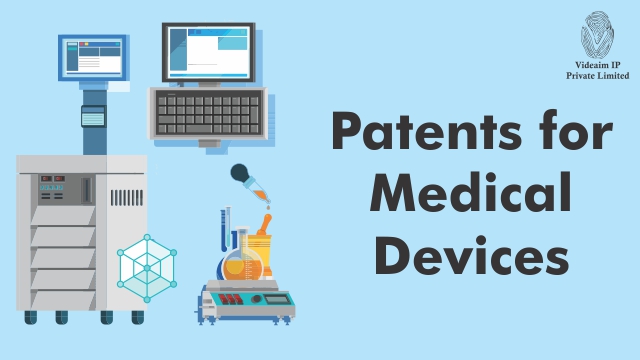
Medical devices and patents are closely linked in the field of medical technology and innovation. Developing and launching a new medical device in the any market requires regulatory compliances and Intellectual Property (IP) protection.
Medical Devices
Medical devices cover a wide variety of products covering instruments, apparatuses and machines, or implants used for medical purposes, such as diagnosing, preventing, monitoring, or treating diseases or medical conditions. They can range from simple tools like syringes and thermometers to complex devices like endoscopes, medical imaging devices, rapid test kits, and robotic surgical systems.
Patents for Medical Devices
Patents play a crucial role in the medical device industry, as they offer protection and incentives for inventors and companies to invest time and resources in developing innovative medical devices. A patent is a legal protection granted by a government to an inventor or assignee for their invention that provides a novel and non-obvious solution to a particular problem.
By obtaining a patent, a medical device manufacturer can prevent others from making, using, or selling their patented invention without permission, thereby creating a competitive advantage in the market. To obtain a medical device patent, the invention must meet certain criteria:
- Novelty: The invention must be new and not publicly disclosed before the filing date of the patent application.
- Non-Obviousness: The invention must involve an inventive step that would not be obvious to someone skilled in the relevant field.
- Usefulness: The invention must have a useful and practical application in the medical field.
- Implementable: The patent application must provide sufficient detail and information for a person skilled in the field to reproduce the invention.
- Utility: The invention must be useful and functional, providing a tangible benefit in the medical field.
- Not Excluded Subject Matter: Some jurisdictions have restrictions on certain types of medical-related inventions, such as methods of medical treatment, which may not be eligible for patent protection.
Benefits of Medical Device Patents
- Exclusive Rights: Patent holders have exclusive rights to their inventions, allowing them to prevent competitors from copying their technology.
- Market Advantage: Patents can create a competitive advantage in the medical device market, making it easier for companies to attract investors and partners.
- Licensing Opportunities: Patents allows inventor or applicant to license their technology to other companies and generate a source of revenue as well..
- Innovation Incentives: Patents encourage innovation by rewarding inventors and companies for their research and development efforts.
Challenges
While patents offer significant advantages, the process of obtaining a patent can be complex and expensive. Additionally, some medical device innovations may face challenges related to patent infringement, design-around strategies, and legal disputes.
It’s important for inventors and medical device companies to work with qualified patent attorneys or patent agents to navigate the patent application process effectively and ensure their inventions receive appropriate protection.
What do we offer?
We at VideaimIP, provide comprehensive services like Prior art search, Freedom to operate search, Landscape of any specific technology domain, and National and International Patent filing to serve the inventor or assignee to obtain a strong intellectual property (IP) portfolio.
Do you want to discuss about your medical device and want to know the opportunity of intellectual property (IP) you can acquire, Please feel free to contact us or Email your queries at info@videaimip.com and videaimip@gmail.com
